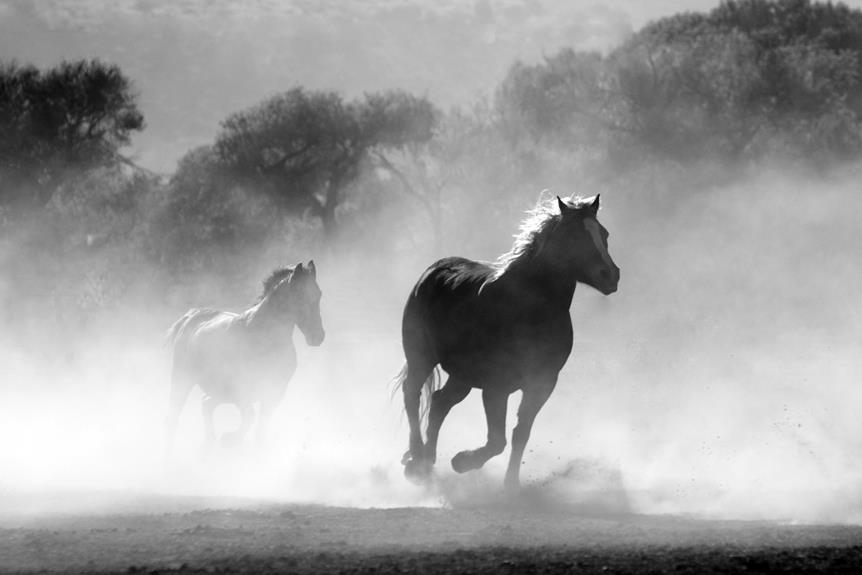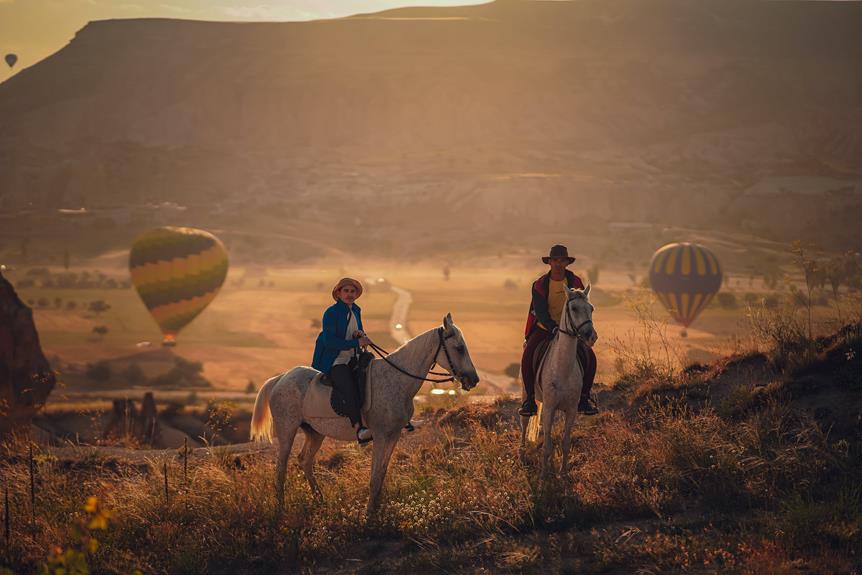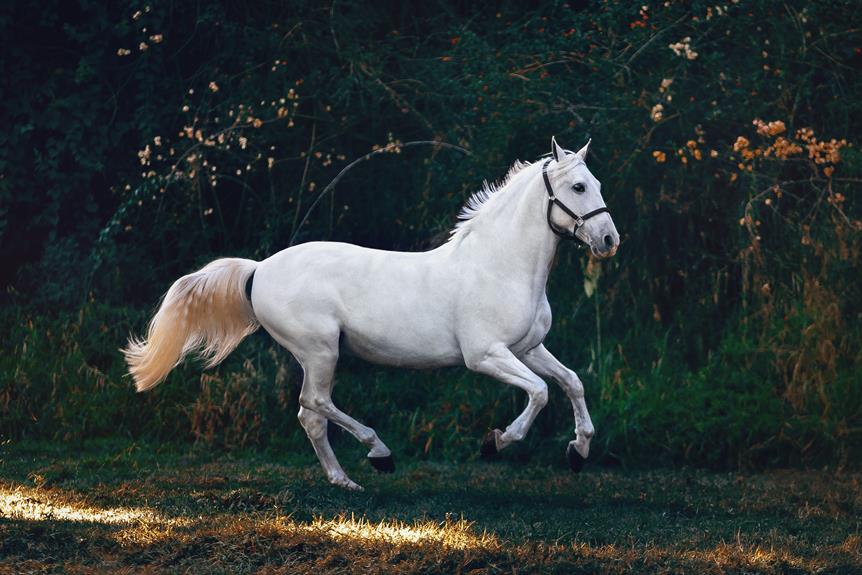Like a wild stallion galloping through open fields, the question of whether you can get a DUI on a horse has intrigued many curious minds. It's a peculiar scenario that prompts us to ponder the intersection of equine transportation and legal consequences.
While the answer might not be as straightforward as hitching a saddle, there are intriguing aspects to explore, from the definition of motor vehicles to the potential charges one might face.
So, saddle up and prepare to embark on a journey through the legal labyrinth that surrounds horseback DUIs.
Key Takeaways
- Riding a horse while intoxicated can lead to charges of public intoxication and animal endangerment.
- The legal classification of horses as vehicles varies by state, leading to differing charges for horseback DUIs.
- Civil liability may arise from any accidents or injuries caused while riding a horse under the influence.
- Public opinion on horseback DUIs varies, with some supportive of treating them the same as DUIs in motor vehicles, others viewing them as a grey area, and some considering them insignificant.
Legal Implications of Horseback DUIs
If you choose to ride a horse while under the influence, be aware of the legal implications that can arise from a DUI on horseback. While it may seem unlikely to be charged with a DWI on horseback in Texas, it's still possible to face other charges such as public intoxication or animal endangerment.
According to Texas law, the definition of a motor vehicle doesn't specifically state that it must be motorized, leaving room for interpretation. This means that riding a horse while intoxicated can be considered public intoxication, as well as endangering the animal's welfare. It's important to note that being intoxicated on a horse counts as being intoxicated in public, as horses are considered vehicles under Texas law.
Factors Influencing Horseback DUI Charges
When it comes to horseback DUI charges, understanding the factors that can influence the legal consequences is crucial. Here are some important factors to consider:
- Vagueness of the law: Texas law defines a motor vehicle as a device used for transportation on a highway, without specifying that it must be motorized. This ambiguity leaves room for interpretation regarding whether a horse qualifies as a motor vehicle.
- Specific state laws: While Texas may not specifically charge individuals with DWI while riding a horse on public roadways, it's essential to be aware that over half of the states in the US consider riding a horse while under the influence as a DUI offense. Therefore, it's important to be familiar with the specific laws of the state regarding DUIs on horses before engaging in such activities.
- Alternative charges: Even if not charged with DWI, riding a horse while intoxicated can still lead to other charges such as public intoxication, animal endangerment, and child endangerment. Additionally, there could be civil liability for any injuries or property damage caused.
- DWI Defense lawyer: If facing DWI or related charges, consulting with a Houston DWI defense lawyer is crucial. They can demonstrate that a DWI charge is inappropriate in certain situations, potentially leading to reduced or dismissed charges.
- Individual circumstances: Factors such as the level of intoxication, previous DUI charges, and any accidents or injuries caused while riding intoxicated can also influence the severity of the charges.
Understanding these factors can help individuals charged with horseback DUI navigate the legal process and work towards a favorable outcome with the assistance of a knowledgeable lawyer specializing in DWI defense.
Comparison of DUI Laws for Motor Vehicles and Horses
The comparison of DUI laws for motor vehicles and horses reveals distinct differences in how these offenses are treated legally. When it comes to riding a horse while under the influence of alcohol, the laws vary from state to state.
In Texas, for example, it's unlikely that you'd face charges of driving while intoxicated (DWI) while riding a horse. This is because the state's DWI statute specifically requires the operation of a motor vehicle on public roadways while intoxicated. However, it's important to note that intoxicated horseback riding can still lead to other charges such as public intoxication and animal endangerment. Additionally, if your intoxicated horseback riding results in injuries or property damage, you may be held liable for civil damages.
It's crucial to consult with a criminal defense lawyer if you find yourself charged with DWI or related offenses while riding a horse. In some states, such as over half of the states in the US, riding a horse while under the influence is considered a DUI offense. These states may differentiate between various types of DUIs, such as DWIs and OWIs.
Potential Consequences of Getting a DUI on a Horse
Facing a DUI on a horse can result in a range of potential consequences. These include charges of public intoxication, animal endangerment, child endangerment if applicable, and civil liability for any resulting injuries or property damage.
It's essential to understand the potential ramifications of riding a horse while intoxicated, as the laws can vary depending on the state. In the United States, over half of the states consider riding a horse while under the influence as a DUI offense.
Here are five potential consequences you may face if charged with a DUI on a horse:
- Public Intoxication: Riding a horse while intoxicated can lead to charges of public intoxication, which can result in fines, community service, or even jail time, depending on state law.
- Animal Endangerment: Intoxicated horseback riding can also lead to charges of animal endangerment, as it puts the horse at risk. This may result in penalties such as fines or restrictions on owning or interacting with animals.
- Child Endangerment: If a child is present while riding a horse under the influence, you may face additional charges of child endangerment, which can have severe legal and personal consequences.
- Civil Liability: Riding a horse while intoxicated can lead to accidents that result in injuries or property damage. In such cases, you may be held civilly liable for any harm caused, leading to potential financial obligations.
- DWI Conviction: Although it's unlikely to be charged with a DWI on horseback in Texas, it's crucial to seek legal representation to contest inappropriate DWI charges. A DWI conviction can have long-lasting effects on your driving privileges and criminal record.
Understanding the potential consequences of riding a horse while intoxicated is vital to make informed decisions and protect yourself legally and morally. Always be aware of the specific DUI laws in your state and seek legal guidance if necessary.
Public Opinion on Horseback DUIs
If you find yourself charged with a DUI on a horse, it is important to consider public opinion on horseback DUIs. Public opinion can vary greatly on this topic, with some people viewing it as a serious offense while others may see it as a humorous or trivial matter. To give you a better understanding of the diverse viewpoints, let's take a look at a table showcasing the different perspectives on horseback DUIs:
| Public Opinion | Viewpoint |
|---|---|
| Supportive | Some individuals argue that riding a horse while intoxicated is no different from driving a car under the influence. They believe that the safety of both the rider and others on the road should be the top priority. |
| Neutral | Others may view horseback DUIs as a grey area, unsure whether it should be treated as a serious offense. They may consider the lack of clarity in the law regarding horses as a potential factor. |
| Not Supportive | On the other hand, there are those who see horseback DUIs as an insignificant issue. They may argue that riding a horse is a slower and less dangerous mode of transportation compared to driving a motor vehicle. |
As you can see, public opinion on horseback DUIs is divided. It is important to keep in mind that public opinion can influence how the legal system handles cases of horseback DUIs. However, the ultimate decision on the legality and consequences of riding a horse while intoxicated lies within the hands of lawmakers and the judicial system.
Frequently Asked Questions
What State Can You Get a DUI on a Horse?
In some states, like Texas, the definition of a motor vehicle is vague. This leaves room for debate on whether riding a horse under the influence can result in a DUI charge.
Can You Get a DUI on a Horse Texas?
You can potentially be charged with a DUI in Texas while riding a horse. Texas DUI laws define a motor vehicle broadly, and if you are intoxicated while riding a horse on public roads, you may face penalties.
Can You Get a DUI on a Horse in Florida?
Yes, you can get a DUI on a horse in Florida. It is important to understand the horseback riding regulations, legal consequences, and safety measures. Awareness campaigns aim to prevent horseback DUIs.
Can You Get a DUI on a Horse in Colorado?
You cannot get a DUI on a horse in Colorado. However, horseback riding under the influence can have serious consequences. Alcohol impairs your riding abilities and poses risks to your safety and others. It's best to avoid riding while intoxicated and find alternative activities.
Conclusion
In conclusion, while you can't get a DUI on a horse in Texas due to it not being a motorized vehicle, there are still potential legal consequences and charges related to public intoxication or animal endangerment.
It's crucial to prioritize safety and responsibility when horseback riding, ensuring compliance with the law.
Always remember to ride sober and respect the well-being of yourself, your horse, and others around you.



0 Comments